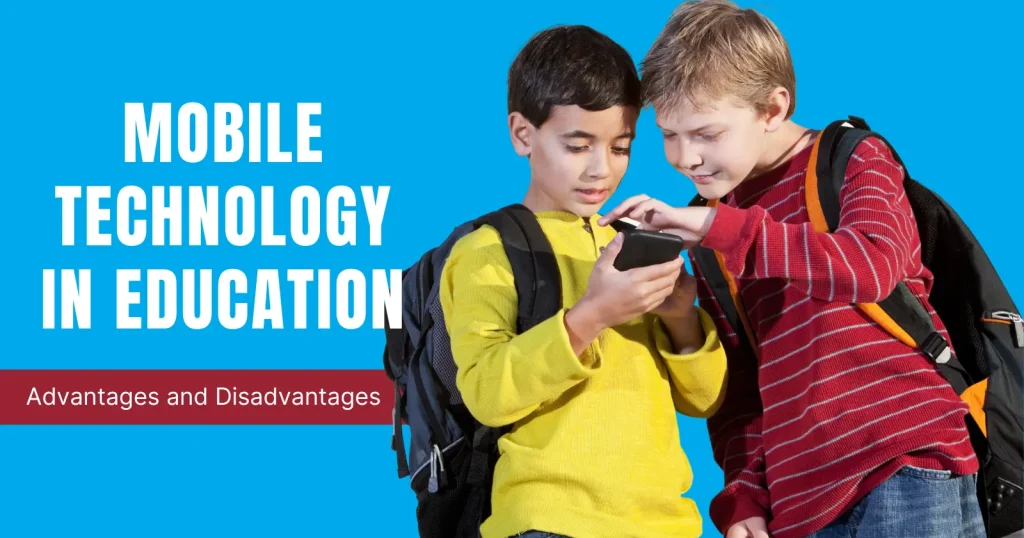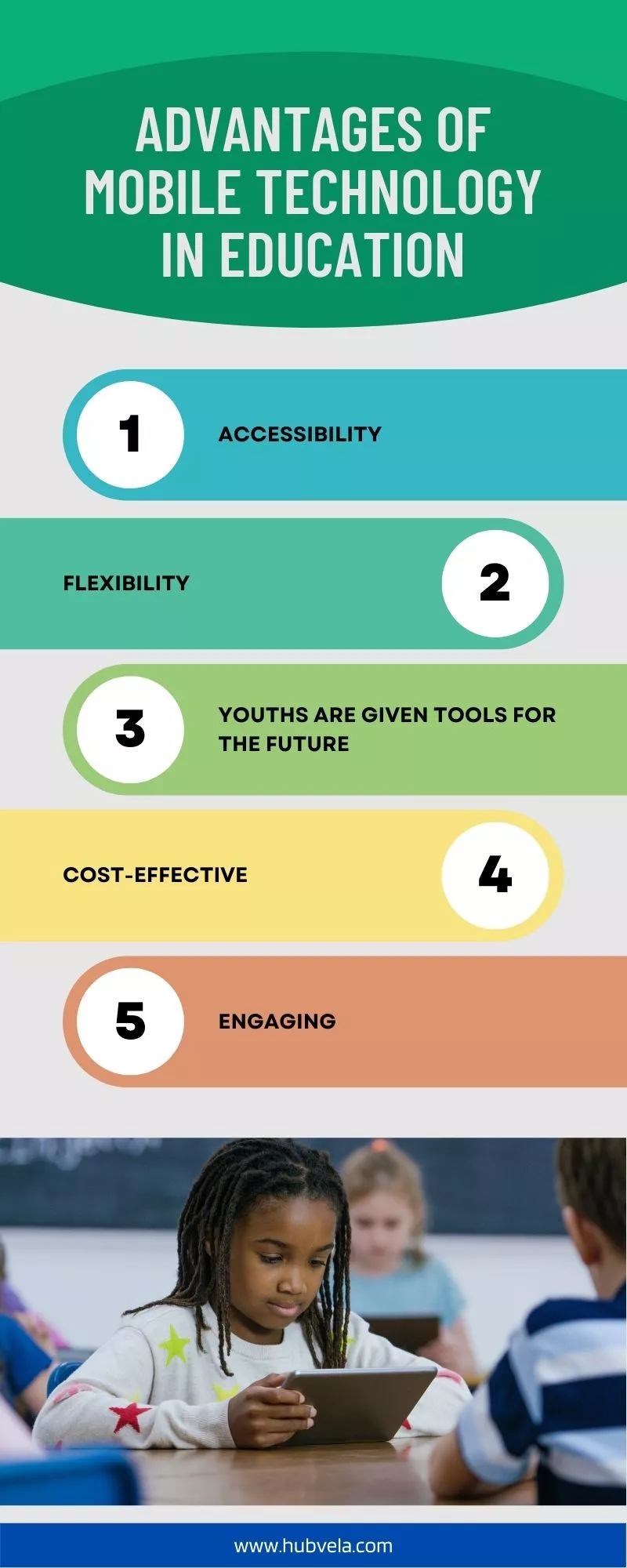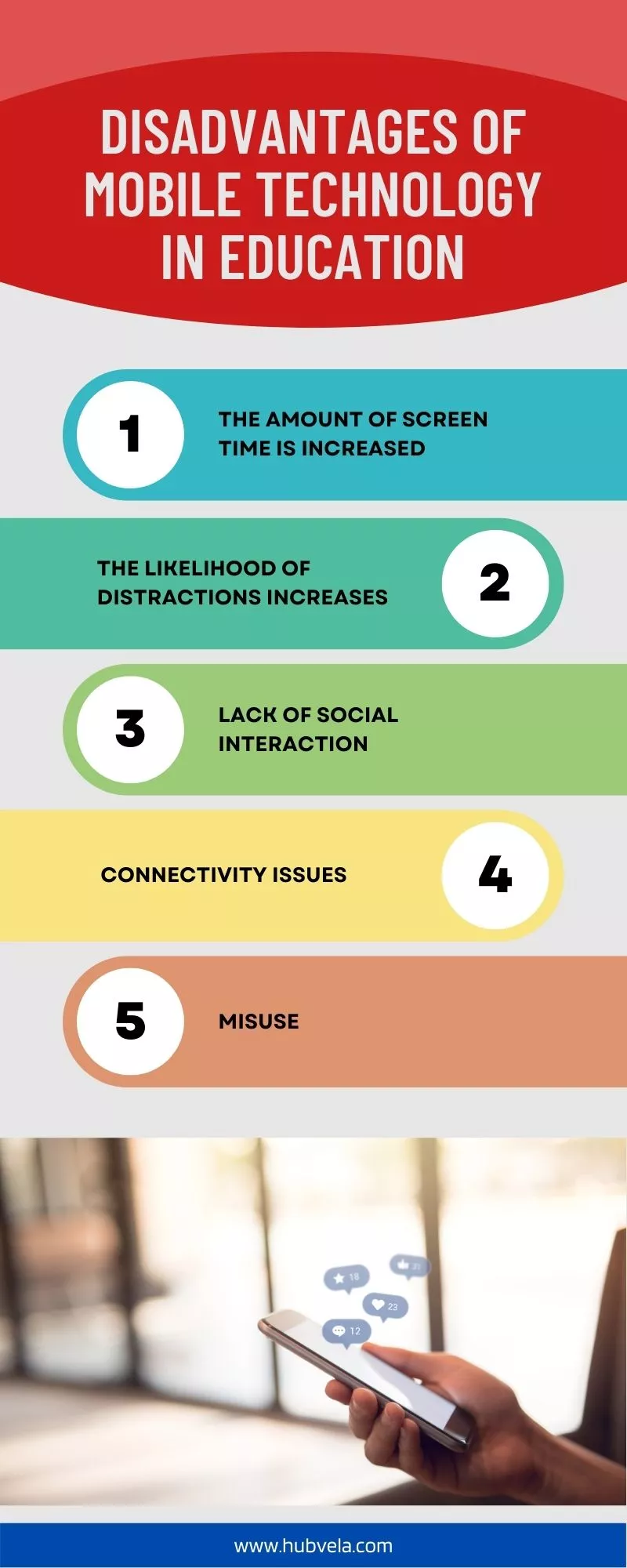Greetings, young scholars! Today we are going to be exploring the wonders of mobile technology in education and the various advantages and disadvantages that come along with it.
As students of the 21st century, you are no doubt accustomed to using cell phones, tablets, laptops, and other electronic gadgets every day – but did you know they can also provide incredible opportunities for learning?
Let’s investigate further and discover some of the potential pros and cons of incorporating mobile technology into your educational experience.

--Advertisement--
Advantages of Mobile Technology in Education
In the ever-evolving digital age, mobile technology has revolutionized education in numerous ways. Students now have access to a wealth of information and resources at their fingertips, enabling them to take learning beyond classroom walls.
The advantages of mobile technology in education are far-reaching; from an increased capacity for collaboration to more efficient assessment methods, the benefits are manifold.
For one, integrating mobile devices into classrooms has accelerated and deepened student engagement with educational content.
Through the use of interactive apps and games, students can gain a more immersive understanding of complex topics than was possible with traditional curricula alone.
Furthermore, mobile technology provides a platform for students from all over the world to communicate and collaborate on projects regardless of location or time constraints, thereby augmenting instruction by exposing learners to diverse perspectives and ideas.
Let’s check the following infographic on the advantages of mobile technology in education.

1. Accessibility
The world has been abuzz with the advantages of mobile technology in education. From enabling students to access resources and information outside the classroom, to providing teachers with a range of digital tools for teaching and assessment, mobile technology is revolutionizing the way we learn.
This innovative shift towards digital learning has also served to make educational settings more accessible and inclusive for all learners.
Mobile devices can be used to empower those who may face physical or financial barriers when it comes to engaging in learning activities, as well as those from diverse cultural backgrounds or different learning abilities.
Moreover, having access to online materials on the go enables learners to take ownership of their own educational journey by allowing them increased freedom and flexibility when it comes to accessing resources.
2. Flexibility
The advantages of mobile technology in education are vast but often overlooked. A lesser-known benefit of this technology is its ability to provide educators and students with a more flexible learning environment.
From the classroom to home, mobile devices have enabled learners to access educational resources from virtually any location.
This creates a more malleable learning experience, as teachers are able to assign work that can be completed outside of the traditional classroom setting without sacrificing rigor or quality. Similarly, students can meet deadlines and partake in group activities while on the go or at home.
Furthermore, mobile devices give teachers heightened control over how they structure their lessons.
Educators can create interactive tasks that invite collaboration and feedback online instead of relying solely on short lecture-style sessions within the four walls of physical classroom space.
3. Youths are given tools for the future
Today’s youth are being presented with unprecedented opportunities to take advantage of the many advancements in mobile technology.
The ability of young people to access information and resources on their phones has revolutionized how they learn, grow, and prepare for success.
By equipping students with the tools they need to succeed in a rapidly changing world, mobile technology can provide an invaluable opportunity for them to cultivate lasting skills that will set them up for success in the future.
In addition to providing youths with a wealth of knowledge at their fingertips, mobile technology has opened new doors in terms of communication and collaboration.
Students now have the freedom to collaborate and communicate effectively no matter where they are located, creating an expansive network of support while also allowing them to stay connected with peers around the world.
4. Cost-Effective
The advantages of mobile technology in education are manifold and cost-effective. With the right strategies, educators can leverage this technology for enriched learning experiences without breaking the bank.
Mobile technology provides students with access to a wealth of resources, from online courses and activities to lecture recordings and tutorials.
Its portability also allows for increased flexibility; teachers can easily bring their devices into classrooms or onto school grounds, allowing them to conduct lessons wherever they go.
Additionally, its ever-increasing computing power means that teachers can now use more sophisticated tools such as augmented reality (AR) or virtual reality (VR) headsets to further enhance student engagement.
Overall, mobile technology has become an invaluable tool for educators seeking to create a more immersive learning environment while saving money in the process.
5. Engaging
In the age of the digital revolution, mobile technology has become an increasingly integral component of modern education.
As such, it offers a number of advantages that can enhance the learning experience for both teachers and students alike.
Firstly, mobile technology allows for greater accessibility through its ability to provide access to content from any location with just a few clicks.
Additionally, it also provides opportunities for interactive learning via various applications and platforms designed specifically for educational purposes.
Finally, mobile devices offer enhanced engagement due to their intuitive interface and ability to engage with real-time feedback from instructors or peers.
By leveraging these advantages of mobile technology in education, educators can create engaging classroom experiences that foster creativity and collaboration among students while providing personalized instruction tailored to individual student needs.
Furthermore, having access to up-to-date information is essential in order to stay abreast of current trends in teaching and research methods.
Disadvantages of Mobile Technology in Education
As mobile technology becomes increasingly omnipresent in our lives, its presence in the classroom has become a subject of debate.
While the advantages of mobile technology are clear, there are some significant drawbacks to utilizing it as part of an educational experience.
The use of mobile devices can lead to a disruption of focus and concentration in class, with students more inclined to use their devices for leisure activities than engaging with their studies.
Additionally, the proliferation of easily accessible online information can lead to cheating, lessening the value and importance of hard-earned knowledge.
Furthermore, studying on small screens has been linked to eyestrain and other physical problems that can be detrimental to students’ health.
Ultimately, while technological advancements should not be ignored when it comes to education, they must be carefully considered before being implemented in classrooms so as not to detract from the learning experience.
Let’s check the following infographic on the disadvantages of mobile technology in education.

1. The amount of screen time is increased
As students today are increasingly exposed to mobile technologies, it is important to consider the potential disadvantages of this exposure.
Recent studies have indicated that there has been a drastic increase in the amount of screen time among children and young adults. This increased reliance on digital devices can lead to a host of negative physical, mental, and social effects.
From neck pain and headaches caused by excessive texting to difficulty focusing due to multitasking between multiple screens, mobile technology has posed many health risks for students.
Furthermore, students who overuse their devices may be missing out on opportunities for meaningful face-to-face interactions with friends and family members which can lead to feelings of isolation or loneliness.
Moreover, extended periods of screen time can take away valuable activities such as outdoor sports or creative projects which could help promote physical activity and healthy development.
2. The likelihood of distractions increases
As mobile technology continues to become ubiquitous in our daily lives, it is becoming increasingly difficult for students and educators alike to avoid distractions.
With the ability to access a plethora of content from the convenience of their phones, tablets, and laptops, it can be hard to focus on the task at hand.
This is particularly true in educational settings where students are expected to pay attention while teachers impart knowledge and understanding.
The prevalence of mobile technology has had a deleterious effect on student learning as students struggle with staying engaged during class time.
Research has also demonstrated that multitasking with mobile devices can interfere with the comprehension and recall of information.
Furthermore, overuse of mobile devices can lead to decreased motivation due to increased dependence on them for entertainment purposes such as social media or gaming.
3. Connectivity Issues
When it comes to education, mobile technology has long been heralded as a driver of innovation and improved student outcomes.
However, recent studies have revealed certain challenges associated with mobile device usage in the classroom.
Namely, connectivity issues can arise due to weak internet connections or app malfunctions simply taking too long to resolve.
In addition to these technical hardships, there are also more nebulous disadvantages associated with increased reliance on technology in academic settings.
For instance, students may become over-reliant on their devices for completing tasks rather than developing essential cognitive skills such as problem-solving and critical thinking.
Furthermore, research indicates that lack of parental engagement can be exacerbated when children are using mobile technologies within the classroom setting.
Consequently, teachers may struggle to effectively nurture educational development when faced with an influx of digital distractions from students’ personal devices.
4. Misuse
The rise of mobile technologies in educational settings has presented a great number of opportunities for students and teachers alike.
But as with every new technology, there lurks the risk of misuse. From plagiarism to cyberbullying, here are some of the major disadvantages associated with utilizing mobile technology in education.
Firstly, modern devices allow for unprecedented levels of access to information and knowledge from around the world.
This can be both a blessing and a curse; while it allows teachers to provide more thorough lessons on any given topic, it can also lead to rampant plagiarism if not monitored closely enough.
Additionally, this extensive access can potentially lead students astray towards less reputable sources that may contain misinformation or biased narratives that could shape their understanding of a subject matter incorrectly or inappropriately.
5. Lack of Social Interaction
In the digital age, mobile technology has become a popular tool for facilitating education. However, many experts are warning of its potential downsides, particularly when it comes to social interaction and communication between students.
Although some people argue that advances in mobile technology can help to improve educational outcomes, there is an increasing concern about how it affects children’s ability to engage with one another on an interpersonal level.
The use of mobile devices such as smartphones and tablets in the classroom can lead to decreased face-to-face interactions among students.
This can have adverse effects on children’s development, both academically and socially.
Research suggests that social interaction is essential for learning; however, when students are fixated on their screens they tend to be less engaged in conversations with their peers which can leave them feeling isolated and disconnected from others.
Conclusion on the Advantages and Disadvantages of Mobile Technology in Education
In conclusion, it is clear that mobile technology in the classroom can be both a blessing and a curse.
It allows for an unprecedented level of engagement among students, teachers, and peers alike, but it also has the potential to detract from meaningful learning.
Ultimately, it is up to educators to utilize this technology wisely by leveraging its advantages and curbing its disadvantages.
With proper implementation and oversight, mobile technology can provide immense educational value, fostering creativity and collaboration among learners of all ages.
Educators should use their knowledge and experience to create a balance between the benefits and drawbacks of implementing mobile technology in their classrooms.


